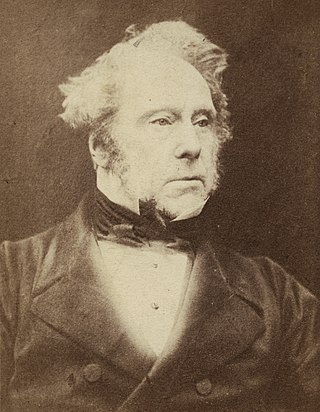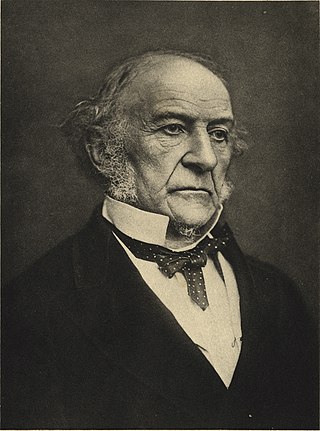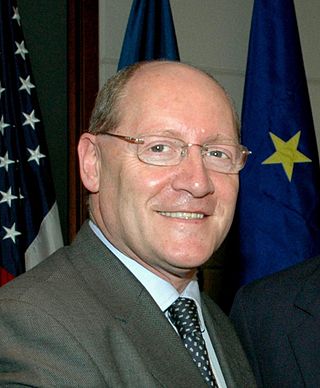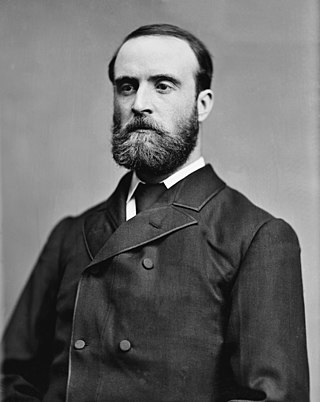
The Liberal Party was one of the two major political parties in the United Kingdom, along with the Conservative Party, in the 19th and early 20th centuries. Beginning as an alliance of Whigs, free trade-supporting Peelites, and reformist Radicals in the 1850s, by the end of the 19th century, it had formed four governments under William Gladstone. Despite being divided over the issue of Irish Home Rule, the party returned to government in 1905 and won a landslide victory in the 1906 general election.

The 1983 United Kingdom general election was held on Thursday 9 June 1983. It gave the Conservative Party under the leadership of Margaret Thatcher the most decisive election victory since that of the Labour Party in 1945, with a majority of 144 seats and the first of two consecutive landslide victories.

Henry John Temple, 3rd Viscount Palmerston,, known as Lord Palmerston, was a British statesman and politician who was twice Prime Minister of the United Kingdom in the mid-19th century. Palmerston dominated British foreign policy during the period 1830 to 1865, when Britain stood at the height of its imperial power. He held office almost continuously from 1807 until his death in 1865. He began his parliamentary career as a Tory, defected to the Whigs in 1830, and became the first prime minister from the newly formed Liberal Party in 1859. He was highly popular with the British public. David Brown argues that "an important part of Palmerston's appeal lay in his dynamism and vigour".

The 1950 United Kingdom general election was the first ever to be held after a full term of Labour government. The election was held on Thursday 23 February 1950, and was the first held following the abolition of plural voting and university constituencies. The government's 1945 lead over the Conservative Party shrank dramatically, and Labour was returned to power but with an overall majority reduced from 146 to just 5. There was a 2.8% national swing towards the Conservatives, who gained 90 seats. Labour called another general election in 1951, which the Conservative Party won.

The 1918 United Kingdom general election was called immediately after the Armistice with Germany which ended the First World War, and was held on Saturday, 14 December 1918. The governing coalition, under Prime Minister David Lloyd George, sent letters of endorsement to candidates who supported the coalition government. These were nicknamed "Coalition Coupons", and led to the election being known as the "coupon election". The result was a massive landslide in favour of the coalition, comprising primarily the Conservatives and Coalition Liberals, with massive losses for Liberals who were not endorsed. Nearly all the Liberal MPs without coupons were defeated, including party leader H. H. Asquith.

The 1885 United Kingdom general election was held from 24 November to 18 December 1885. This was the first general election after an extension of the franchise and redistribution of seats. For the first time a majority of adult males could vote and most constituencies by law returned a single member to Parliament, fulfilling one of the ideals of Chartism to provide direct single-member, single-electorate accountability. It saw the Liberals, led by William Gladstone, win the most seats, but not an overall majority. As the Irish Nationalists held the balance of power between them and the Conservatives who sat with an increasing number of allied Unionist MPs, this exacerbated divisions within the Liberals over Irish Home Rule and led to a Liberal split and another general election the following year.

The 1865 United Kingdom general election saw the Liberals, led by Lord Palmerston, increase their large majority over the Earl of Derby's Conservatives to 80. The Whig Party changed its name to the Liberal Party between the previous election and this one.

The 1859 United Kingdom general election returned Liberal Party to a majority of seats in the House of Commons. The Earl of Derby's Conservatives formed a minority government. but despite having made small overall gains in the election, Derby's government was defeated in a confidence vote by an alliance of Palmerston's Whigs together with Peelites, Radicals, and the Irish Brigade. Palmerston subsequently formed a new government from this alliance which is now considered to be the first Liberal Party administration.

In the 1857 United Kingdom general election, the Whigs, led by Lord Palmerston, won a majority in the House of Commons as the Conservative vote fell significantly. The election had been provoked by a vote of censure in Palmerston's government over his approach to the Arrow affair which led to the Second Opium War.

The Representation of the People Act 1867, known as the Reform Act 1867 or the Second Reform Act, is an act of the British Parliament that enfranchised part of the urban male working class in England and Wales for the first time. It took effect in stages over the next two years, culminating in full commencement on 1 January 1869.

The 1994 European Parliament election was the fourth European election to be held in the United Kingdom. It was held on Thursday 9 June, though, as usual, the ballots were not counted until the evening of Sunday 12 June. The electoral system was, for the final European election, first past the post in England, Scotland and Wales and single transferable vote in Northern Ireland. This was the first election with 87 MEPs, the European Parliamentary Elections Act 1993 having increased the number of seats for the UK from 81. For the first time, the UK did not have the lowest turnout in Europe. Turnout was lower in the Netherlands and Portugal.

The 1999 European Parliament election was the United Kingdom's part of the European Parliament election 1999. It was held on 10 June 1999. Following the European Parliamentary Elections Act 1999, it was the first European election to be held in the United Kingdom where the whole country used a system of proportional representation. In total, 87 Members of the European Parliament were elected from the United Kingdom across twelve new regional constituencies.

The 2004 European Parliament election was the United Kingdom's part of the wider 2004 European Parliament election which was held between 10 and 13 June 2004 in the 25 member states of the European Union. The United Kingdom's part of this election was held on Thursday 10 June 2004. The election also coincided with the 2004 local elections and the London Assembly and mayoral elections. In total, 78 Members of the European Parliament were elected from the United Kingdom using proportional representation.
In the United Kingdom, the word liberalism can have any of several meanings. Scholars primarily use the term to refer to classical liberalism. The term can also mean economic liberalism, social liberalism or political liberalism. It can simply refer to the politics of the Liberal Democrats, a UK party formed from the merger of two centrist parties in 1988. Liberalism can occasionally have the imported American meaning; however, the derogatory connotation is much weaker in the UK than in the US, and social liberals from both the left and right wing continue to use liberal and illiberal to describe themselves and their opponents, respectively.

The 2005 United Kingdom general election was held on Thursday 5 May 2005, to elect 646 members to the House of Commons. The governing Labour Party, led by Tony Blair, won its third consecutive victory, with Blair becoming the second Labour leader after Harold Wilson to form three majority governments. However, its majority fell to 66 seats; the majority it won four years earlier had been of 167 seats. This was the first time the Labour Party had won a third consecutive election, and as of 2024 remains the party's most recent general election victory.
Cambridge University was a university constituency electing two members to the British House of Commons, from 1603 to 1950.

Tiverton was a constituency located in Tiverton in east Devon, formerly represented in the House of Commons of the Parliament of the United Kingdom. Enfranchised as a parliamentary borough in 1615 and first represented in 1621, it elected two Members of Parliament (MPs) by the first past the post system of election until 1885. The name was then transferred to a county constituency electing one MP.
John Greene was an Irish landowner and politician from County Kilkenny.

The 1885 general election in Ireland was the first election following the Representation of the People Act 1884 and the Redistribution of Seats Act 1885, which redrew the Irish electoral landscape.
The 2016 North Tyneside Metropolitan Borough Council election took place on 5 May 2016 to elect members of North Tyneside Metropolitan Borough Council in England. This was on the same day as other local elections.















